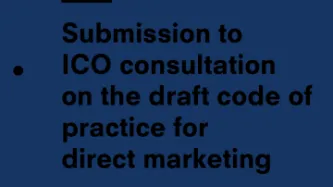Search
Content type: Examples
Colombia's has launched the free, Android-only, prevention-focused Colombia-Coronapp developed by the National Health Institute (INS) to help identify and eradicate the virus across the country, as well provide centralisation and transparency. Besides their basic information, users are asked to say if they have participated in any mass events in the prior eight days, a controversial question because of the recent protests across the country. The app also provides safety tips, an updated map of…
Content type: Examples
China's airport screening, which includes scanning all arriving passengers for fever using “noncontact thermal imaging” since late January and requiring passengers to report their health status on arrival, look reassuring but won't stop the spread of the novel coronavirus because experience with other diseases shows it's very rare for screeners to detect infected passengers (even where they exist) and it has little impact on the course of an outbreak when they do. Ben Cowling, an epidemiologist…
Content type: Examples
Software on smartphones dictates whether an individual should be quarantined. Chinese citizens in 200 cities, beginning with Hangzhou, are required to install the Alipay Health Code app, developed by Hangzhou's local government with the help of Alipay owner Ant Financial, on their smartphones. After users fill in a form with personal information including name, national ID number, contact information, and details of recent travel, the software generates a QR code in one of three colors. Green…
Content type: Examples
The Austrian telecom operator A1 has voluntarily provided the government with "anonymized" location data of its customers for the first two Saturdays in March. The data shows that citizens have significantly reduced their social contacts. After critics expressed privacy concerns, the company issued a statement saying that: the movement profiles have been available for some time in a collaborative projects with a spinoff from the Graz University of Technology; no conclusions can be drawn about…
Content type: Examples
A group of independent developers in Argentina started CoTrack, a public crowdsourced effort to develop an app to track and slow the spread of the virus. CoTrack registers each user's geographic movements and looks for times when they are close to people who have been diagnosed with COVID-19. When there is a confirmed case, a user who has the app can share their data with the community so others can automatically be notified that they should take precautions. The Ministry of Health for the area…
Content type: Examples
An Argentinian crowdsourcing website is collecting information on flights with passengers who were reported as testing positive for COVID-19. Users are asked to enter their email address and the date, airline, and flight number, and tick a box to indicate that someone on their flight was infected. No information is provided on who operates the site, but the terms and conditions indicate that it uses open data flows alongside the collected data.
Source: http://www.checkmyvirusrisk.com/CO/…
Content type: Examples
The Israeli compnay NSO Group, best known for the spyware it sells governments and has been used to target journalists and advocates, says it has developed a product aimed at analysing data to map people’s movements to identify who they’ve come in contact with, which can then be used to stop the spread of infection. About a dozen countries are reportedly testing the NSO technology, which takes two weeks' worth of mobile phone tracking information from the infected person, which it then matches…
Content type: Examples
In a statement, Vodafone said it is "producing an aggregated and anonymous heat map for the Lombardy region in Italy to help the authorities to better understand population movements in order to help thwart the spread of COVID-19." The company offered to help governments develop insights based on large anonymised datasets wherever technically possible, and legally permissible, Vodafone will be willing to assist governments in developing insights based on large anonymised data sets.
Source:…
Content type: Examples
Three years ago, the Alphabet subsidiary Verily developed a software platform, Project Baseline, to run clinical trials on a group of volunteers who agree to share their medical data with a group of researchers at pharmaceutical companies and research hospitals. In early March, Verily began considering whether and how the software could be used to help detect COVID-19. To date, the site is in beta mode, and consists of a questionnaire that links local Bay Area residents to three testing sites.…
Content type: Examples
Technology companies are struggling to cope with the flood of misinformation spreading across the internet, both on social media sites and on the open web, where 4,000 new websites have been created since the beginning of the year that include "coronavirus" in their title and 3% of which are considered malicious. The problem appears to be less coordinated misinformation campaigns than speculation and rumours that are organically spread. As part of the efforts to combat the problem, Google…
Content type: Examples
Twitter announced that searching for COVID-19 will take you to a page featuring recent stories from public health organizations and credible mainstream news sources. The search takes common misspellings into account. The company also said it would take a zero-tolerance approach to platform manipulation to sow discord via large-scale information operations.
Source: https://www.theverge.com/interface/2020/3/5/21164683/covid-19-tech-response-facebook-google-twitter-microsoft-youtube-whatsapp…
Content type: Examples
WhatsApp is being flooded with fake cures, false information about how the illness is transmitted, and coronavirus conspiracy theories, and has become a vector for spreading panic and misinformation around the world, particularly in countries such as Nigeria, Singapore, Brazil, Pakistan, and Ireland. In Botswana, the government has begged the population to be wary of what they're reading on the app. The fact that WhatsApp messages are encrypted, readable only by sender and recipients makes…
Content type: Examples
Ministers have permitted the Shin Bet security service to "use the cellular phone data of carriers of the disease to retrace their steps and identify anyone they may have infected", and will relay the information to the Health Ministry, which will send a message to those who were within two meters (6.6 feet) of the infected person for 10 minutes or more, telling them to go into quarantine. An update to the original order has extended the period during which it is in force from 30 days until the…
Content type: Examples
A task force at the Italian Ministry of Innovation, in collaboration with the University of Pavia to leverage big data technologies to deal with COVID-19, after the WHO advised governments that lockdowns alone are not enough, and that testing, isolation, and contact tracing are crucial. The effort is beginning with anonymised data provided by Facebook; Italian telcos including Tim, Vodafone, Wind Tre, and FastWeb, via their Asstel trade association, have also offered anonymous datasets…
Content type: Examples
A task force at the Italian Ministry of Innovation, in collaboration with the University of Pavia to leverage big data technologies to deal with COVID-19, after the WHO advised governments that lockdowns alone are not enough, and that testing, isolation, and contact tracing are crucial. The effort is beginning with anonymised data provided by Facebook; Italian telcos including Tim, Vodafone, Wind Tre, and FastWeb, via their Asstel trade association, have also offered anonymous datasets…
Content type: Examples
In a rare departure from personalisation, Facebook announced that it had begun inserting a box into its news feed directing users to the Centers for Disease Control’s page about COVID-19, potentially driving many millions of users to reliable information from an authoritative source. Facebook also granted unlimited free ad credits to the World Health Organization to promote accurate information about the crisis. The company also promised to remove “false claims and conspiracy theories that have…
Content type: Examples
Facebook announced on its blog that it was providing researchers at Harvard University’s School of Public Health and National Tsing Hua University in Taiwan with aggregated and anonymised mobility data and high resolution population density maps to help inform their forecasting models for the spread of the virus as part of the company's broader "Data for Good program". Facebook said it might expand these efforts to a broader set of partners in the coming weeks. They are also helping partners…
Content type: Examples
Facebook is providing researchers at Harvard University’s School of Public Health and National Tsing Hua University in Taiwan "aggregated and anonymized" mobility data and high resolution population density maps to help inform their forecasting models for the spread of the virus as part of our broader Data for Good program. Facebook may expand these efforts to a broader set of partners in the coming weeks. They are also helping partners understand how people are talking about the issue online…
Content type: Examples
Software on smartphones dictates whether an individual should be quarantined. Chinese citizens in 200 cities, beginning with Hangzhou, are required to install the Alipay Health Code app, developed by Hangzhou's local government with the help of Alipay owner Ant Financial, on their smartphones. After users fill in a form with personal details, the software generates a QR code in one of three colors. Green enables its holder to move about unrestricted. Those with yellow codes may be asked to stay…
Content type: Case Study
There are 29.4 million refugees and asylum seekers across the globe today. These are people who have fled their countries due to conflict, violence or persecution seeking protection in safer environments.
People have protected those in need fleeing from dire situations since antiquity. However, over recent years, European countries have become increasingly hostile towards refugees - treating them as criminals instead of people in need.
In 2017, German authorities passed a…
Content type: News & Analysis
Almost a year and a half ago we complained about seven companies to three data protection authorities in Europe. These companies, ranging from AdTech to data brokers and credit rating agencies, thrive on the collection, exploitation and processing of personal data. They profile and categorise people - without our knowledge and infringing multiple legal requirements.
Now, the French Data Protection Authority CNIL has informed us that they are following the same route and …
Content type: News & Analysis
Unless this is the first time you’ve come to our website, you will notice that it looks very different today. We have a new logo and new brighter colours (read more about our new visual identity here). But our rebrand isn’t just a new visual identity, it’s a new way of talking about our work, and a new way of working with you. We asked ourselves two questions - ’What does PI stand for?’ and 'What kind of future is PI campaigning for?’ Our rebrand is the culmination of a year of critical…




